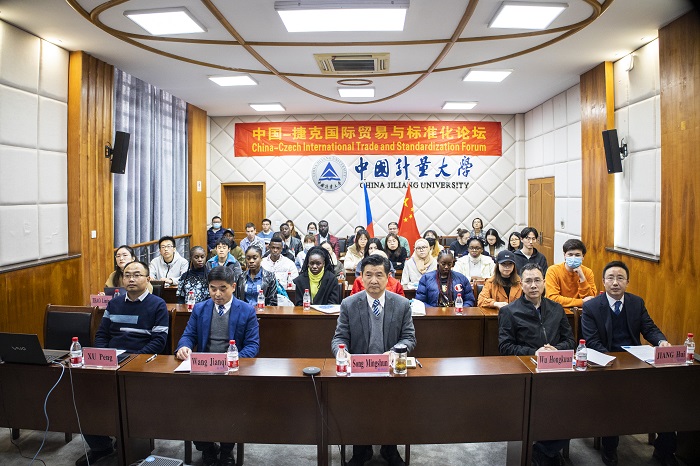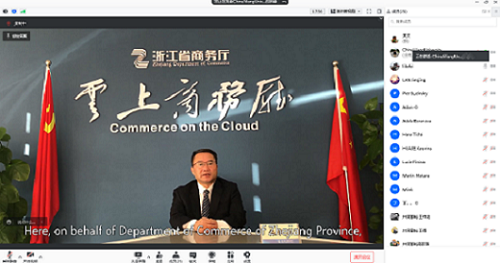On the afternoon of November 25, China-Czech International Trade and Standardization Forum was held at Video Meeting Room 204, Wen Hall. This forum is hosted by China Jiliang University (CJLU), and co-organized by Confucius Institute at University of Finance and Administration (VSFS), Zhejiang-Czech Prague Silk Road Institute, Zhejiang-Czech Center for People-to-People and Cultural Exchanges, Research Institute for Central and Eastern Europe. The forum was held both online and offline. Zhang Qianjiang, deputy director-general of Zhejiang Provincial Department of Commerce; Lan Jingjing, director of International Office of Zhejiang Provincial Department of Education; Song Mingshun, director of CJLU Academic Committee and former president of CJLU attended the forum and delivered speeches. Petr Budinský, vice rector of University of Finance and Administration (VSFS); and leaders from Huajie (Europe), Noark (Europe), and Dahua (Czech) attended the forum. The forum was chaired by director of Office for International Exchanges and Cooperation of CJLU.


Deputy director-general Zhang Qianjiang extended warm congratulations on convening of the forum on behalf of Zhejiang Provincial Department of Commerce. He pointed out that the economic and trade cooperation between Zhejiang province and the Czech Republic covers a wide range of fields and is advancing steadily. Despite the pandemic’s continuing spread, the trade between Zhejiang province and Central and Eastern European countries (CEEC) remains growing, injecting new energy into the recovery of world economy. In the next five years, Zhejiang will strive to import 20 billion US dollars worth of goods from CEEC, make two-way investment of over 1.5 billion US dollars, and complete Belt and Road Czech Station project by 2022, so as to make Zhejiang a central hub of China-CEEC cooperation and an important bridge for CEEC to enter Chinese market.

Lan Jingjing, director of International Office of Zhejiang Provincial Department of Education said that Zhejiang province has always taken openness as priority in the education section, and support various kinds of education cooperation. Zhejiang province has achieved fruitful results in all-around international cooperation programs. The Czech Republic has always been a key partner in education cooperation. A number of higher education institutions in Zhejiang province have established partnerships with universities in the Czech Republic. This June, China-CEEC Education Cooperation Seminar was successfully held. Ms Lan recognized CJLU’s positive role in contributing to high-quality development of the Belt and Road. She hoped that China and the Czech Republic will establish a regular mechanism for exchanges and cooperation so as to jointly boost bilateral economic and cultural exchanges.

Song Mingshun, director of CJLU Academic Committee and former president of CJLU introduced profile and characteristics of CJLU. He reviewed profound friendship between China and the Czech Republic, and the achievements of co-establishing Confucius Institute at University of Finance and Administration (VSFS), Zhejiang-Czech Prague Silk Road Institute, Zhejiang-Czech Center for People-to-people and Cultural Exchanges, and Research Institute for Central and Eastern Europe. He hoped that CJLU will further deepen exchanges and cooperation with institutions in the Czech Republic so as to promote high-quality economic and social development of the two sides through scientific research, personnel exchanges, standards development, etc.
This forum focused on china-Czech bilateral economic and trade cooperation, international trade, standardization education and globalization. Petr Budinský, vice rector of VSFS, shared his research on the global economy and financial markets, analyzing the risks and challenges of global financial markets in 2021 through detailed data on COVID-19, public budgets deficit, inflation, supply-consumer relations, and energy prices. Jiang Hui, associate professor from College of Economics and Management of CJLU and director of Confucius Institute at University of Finance and Administration in Prague introduced development of strategic partnerships between China and the Czech Republic, analyzed data of economic and trade exchanges between the two sides. He believed that China-CEEC cooperation has great potential. Katerina Galajdova, business specialist and export coordinator of the project “Let’s Go China” of Huajie (Europe) introduced Belt & Road Czech Station, and overall design and operation of “Let’s Go China” project. Martin Matuna, human resources manager of Noark (Europe) introduced profile, development history, workforce structure and marketing of the company, and discussed business environment, trade and labor markets of Czech and Middle EU. Adéla Boráňová, administration director of Dahua (Czech) introduced Profile of Dahua and shared her study experience in China. She stressed the importance of academic and cultural exchange, encouraged youngsters to keep open-minded and actively participate in cross-cultural activities. Lucie Finova, director of International Office of VSFS introduced the history and profile of VSFS. She presented international cooperation programs of VSFS, emphasizing importance of international cooperation for higher education. Zhao Liming, a teacher from College of Standardization of CJLU elaborated on economic resilience in the context of globalization. She pointed out that more resilience requires more global economic cooperation, and discussed the positive role of standardization in economic resilience and international trade from the perspective of China-Czech bilateral trade.

Over 80 Chinese and foreign guests and representatives of faculties and students gathered to have in-depth discussions on the themes of the forum, reviewed and analyzed the vigorous development and huge growth potential of China-Czech economic and trade cooperation. The forum brought together experts and scholars in the fields of economy, trade and standardization education from China and the Czech Republic, built a platform for bilateral dialogue and exchange in the fields of economy, trade, education and people-to-people exchanges, which actively contributes to construction of the Belt and Road.

